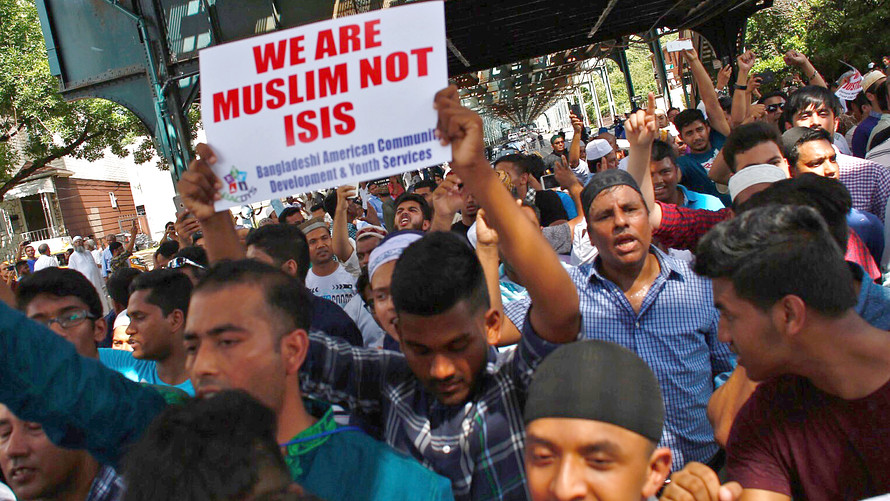The Pew Research Center on Wednesday released the results of a far-reaching new survey of Muslims nationwide that highlighted a broad sense of anxiety and unease about their place in the United States and with a president who most consider unfriendly toward Muslims.
"Overall, Muslims in the United States perceive a lot of discrimination against their religious group, are leery of President Donald Trump and think their fellow Americans do not see Islam as part of mainstream U.S. society,” the study’s authors wrote.
Pew surveyed a nationally representative sample of 1,001 Muslim adults by telephone between January and May this year, and overall results carry a six-point margin of sampling error.
The share of U.S. Muslims who have experienced discriminatory treatment is trending upward, the research center found, with 48percent of respondents saying they were subjected to at least one discriminatory incident based on religion over the past year, compared with 40percent a decade ago.
A large majority — 75 percent — said there is a lot of discrimination against Muslims in the United States. Nearly three-quarters said Trump is unfriendly toward Muslims, compared with just 4 percent who said that of President Barack Obama in 2011. And about two-thirds said they don’t like where the nation is headed.
One immigrant Muslim man, who spoke to Pew on the condition of anonymity, said that the start of Trump’s "Muslim ban” — a travel ban that the president sought to enforce against the citizens of seven majority-Muslim countries — felt like the official launch of a campaign of anti-Muslim persecution.
Most of the estimated 3.35million Muslims living in the United States are immigrants or the children of immigrants. And nearly two-thirds of those surveyed said they think the American public does not consider Islam a part of mainstream society.
The poll finds that Trump is not the only source of mistrust. Six in 10 respondents said they think U.S. media coverage of Islam and Muslims is unfair.
About a third of Muslims said they have been treated with suspicion at least once over the past year, the highest in Pew surveys since 2007. Nearly 1 in 5 said they have been called offensive names, and a similar share have seen anti-Muslim graffiti in their communities. Six percent said they were physically threatened or attacked, identical to the share saying this in 2011.
Those who appear Muslim — either because of the way they look, dress or speak — are significantly more likely to experience discrimination for being Muslim, and women overall are more likely to report discrimination than men.
And a significant minority — one third — said they are at least somewhat worried that the government is tapping their phones because of their religion. The poll finds that 30 percent said they are skeptical of law enforcement sting operations against suspected terrorists, thinking that authorities mostly arrest "people who were tricked and did not pose a real threat.” More, 39 percent, said Muslims arrested in such operations are mostly violent people who pose a real threat.
Amid all that, the study also reflects a couple of profound paradoxes that may result in part from the experiences of a deeply polarized nation.
The study found that Muslims are overwhelmingly proud of both their Muslimness and their Americanness, with 89 percent expressing pride in both. And although nearly half of American Muslims said they have experienced some form of discrimination in the past 12 months, a similar 49 percent said they had experienced support for being Muslim — a sizable shift from 10 years ago, when only 32percent said they had received support.
"In a sense, with rising Islamophobia has come more support from the American public,” said Amaney Jamal, a politics professor at Princeton University who served as an adviser on the study.
The findings underscored a strange optimism amid the wariness toward Trump and the anxieties about hate crimes. Pew found that there has been a slight increase in the percentage of Muslims who say that Americans are friendly toward Muslims — from 48percent in 2011 to 55percent in 2017. Muslims are also 19 percentage points more likely than the general public to say that Americans are friendly toward Muslims. Muslim immigrants and men are the most likely to have a sunny outlook on how Americans view them.
/323
source : WashingtonPost
Thursday
27 July 2017
1:54:13 PM
844513

(AhlulBayt News Agency) - Discrimination against Muslims is common and on the rise — and so, too, are expressions of support for Muslims, according to a new study on one of the United States’ fastest-growing religious minorities.
